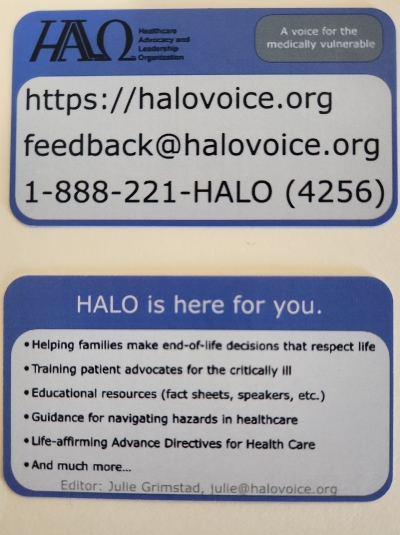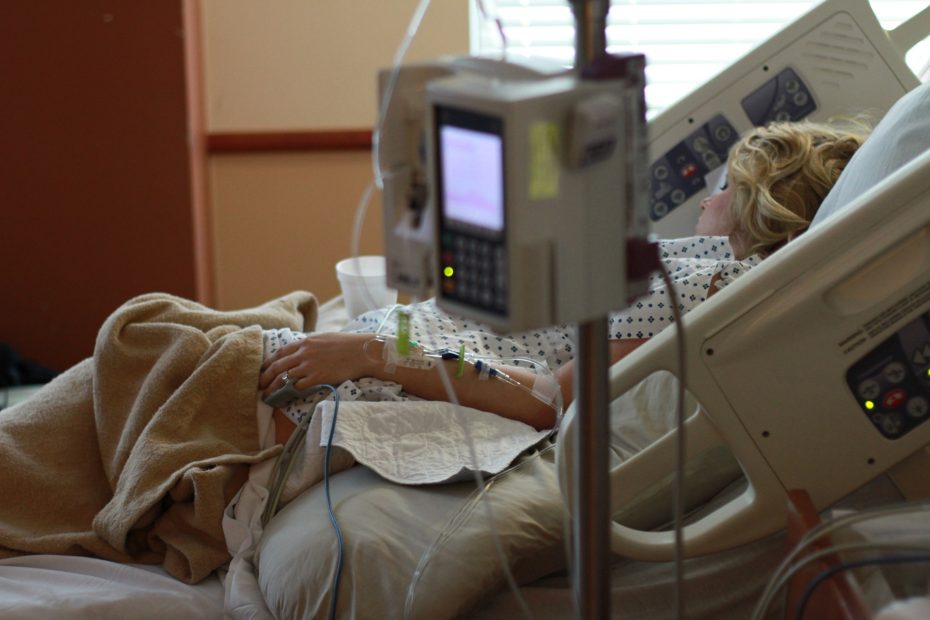By Julie Grimstad
Everyone involved in the Healthcare Advocacy and Leadership Organization makes one crucial commitment: to be a voice for the medically vulnerable. We each have had experiences that led us to participate in HALO’s mission.
I have always had a heart for the sick and suffering. When I was young, I cared for geriatric patients as a licensed practical nurse. Later, compelled by circumstances to become a pro-life patient advocate, I found my calling. Nearly 40 years later, I am still helping families navigate the healthcare system and be voices for their medically vulnerable loved ones.
There is no particular reason that I became and remain committed to patient advocacy. There is no one reason – there are multiple reasons. Every reason has a name and a life story.
Two Particularly Memorable Reasons
Jane, my sociable 92-year-old neighbor and a hardy Montanan, was my first opportunity for patient advocacy. Jane was hospitalized with a kidney infection. A few days into her hospital stay while sitting with her at lunch, I noticed she could not swallow any food, not even ice cream. Because her intravenous line had been removed, she was not getting fluids either. I advised Jane’s daughter, Marge, to obtain a list of her mother’s medications, then we took it to my pharmacist and asked if anything on the list could impair swallowing. “Yes,” he responded, “the antipsychotic drug Haldol can cause swallowing difficulties. Stop it.” Marge and I asked Jane’s attending physician to stop the Haldol. He refused, telling us to find another doctor if we did not trust him. So, we did. Jane’s new doctor complied. He also ordered speech therapy to help Jane regain her ability to swallow. Had we not intervened, Jane undoubtably would have died of starvation and dehydration. Happily, she lived for several more years.
About 20 years later, I received a call from a family who attended my church in a small town in Wisconsin. Their husband and father, Joe*, had suffered a massive stroke after open-heart surgery. The attending physician told Joe’s family there was “no hope,” that Joe would never regain consciousness or recognize them again. The doctor suggested stopping life-support. I told the family that it was too soon to be certain – “Where there is life, there is hope.” They decided to continue treatment and pray. Joe’s son-in-law discovered that, in addition to a morphine drip, Joe had a Fentanyl patch. Providentially, a few days earlier I had read a warning from Janssen Pharmaceuticals, Fentanyl’s manufacturer, that this potent analgesic should not be used when a person has suffered trauma to the brain. This information was delivered to Joe’s doctor who promptly removed the patch. Eventually weaned off the ventilator and moved to a nursing home, Joe started to recover. One morning, when his wife entered his room, Joe asked, “What’s for breakfast?” In time, with his mental faculties and ability to speak intact, Joe went home in the care of his wife.
The HALO Helpline
One of the reasons we started HALO six years ago was to create a way to reach more people in need of patient advocacy and education. Since the HALO Helpline (1-888-221-4256) began operating, we have received calls from people all over this country with diverse needs. Some seek help navigating the healthcare system in order to get the care a loved one needs. Others request HALO’s educational materials. Callers frequently have questions about the treatment a loved one is receiving/not receiving in hospice or how to choose a hospice. Sadly, we answer many calls from people grieving the loss of loved ones under suspicious circumstances.
Everyone needs to talk. We listen, advise, refer to experts, educate, comfort, and offer prayer.
Not every case has a happy conclusion. However, regardless of the outcome, we know that our callers are looking for someone who will understand and do their best to help. These are not just “cases” to us; these are human beings in need of our tender loving concern and attention. Please pray that everyone involved with HALO will always deliver on our commitment to be a voice for the medically vulnerable.
*Joe is not this man’s real name.

Note: The HALO information card pictured above is available upon request. You can help spread the word about HALO by carrying a few of these cards with you to give people when opportunities present themselves. Request cards by sending your name and address to feedback@halovoice.org. We sincerely thank you.
This article has been reprinted with permission. You can find additional information about HALO or how to help a vulnerable loved one at halovoice.org.
